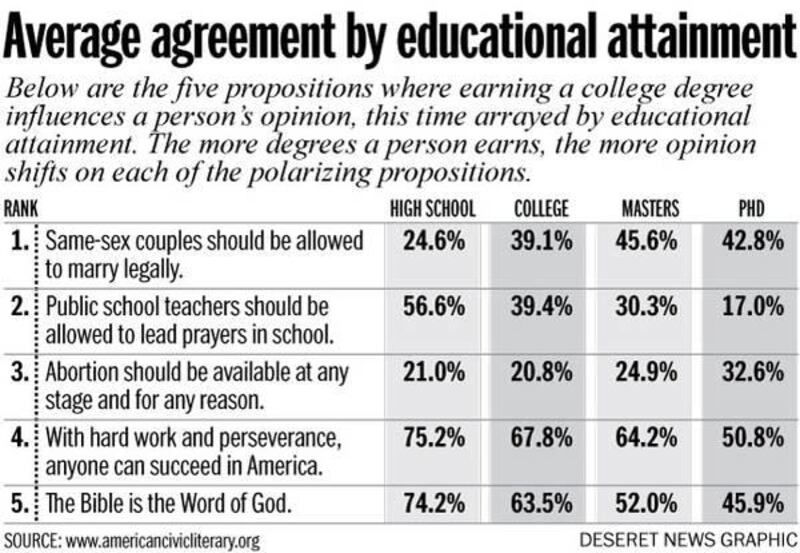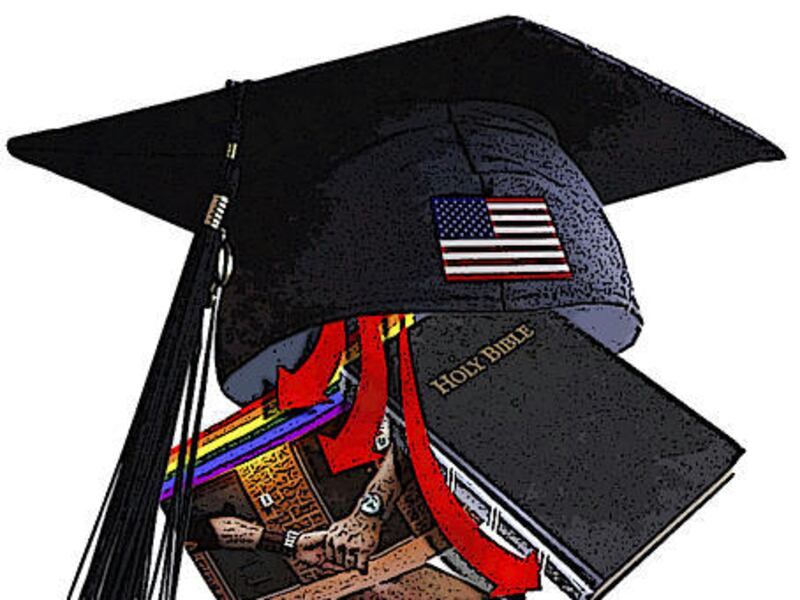When it comes to moral and religious issues, does a college education create open-minded and tolerant citizens, or citizens who are aligned with their often-liberal college professors?
In politics, do Americans follow their internal moral compass, or are they highly influenced by academics and popular culture?
Those questions are prompted by a recent Intercollegiate Studies Institute survey titled "The Shaping of the American Mind." The report says college graduates likely favor same-sex marriage and abortion on demand, and are less likely to favor prayer in public schools or believe the Bible is the word of God.
While those findings won't surprise anyone attuned to the nation's political trends, the reason "why" does say a lot about independent thinking in American culture.
The ISI's survey of 2,508 U.S. adults shows that graduating from college "does not significantly impact a person's views on economic issues," nor does it significantly influence a person's "civic knowledge" — their understanding of American history, government or foreign affairs.
But it does conclude that a college degree tends to result in a more liberal political outlook. Greater "civic knowledge," however, tends to result in a more conservative political stance and influences thinking on several hot-button topics.
Elaine Englehardt, distinguished professor of ethics at Utah Valley University, has taught thousands of students about the wide continuum of thought on moral issues.
Because Utah Valley is one of the most highly conservative areas of the country, she said, "Many of our students come to the university with a very strong political point of view. We ask them to read a variety of sources on political topics like business ethics, abortion, war and nuclear war and to understand that there are numerous points of view."
She said education has long threatened a sector of the population, noting "Socrates died for that," after Greek rulers decided he was corrupting the youth of Athens by teaching them theories that didn't align with prevailing beliefs.
At UVU, "we don't encourage them to change their point of view, just to be well-educated on the issues. When someone asks a student their view on abortion, for instance, the student should be able to say more than 'I'm against it just because.' They should be able to give a reasonable argument that would defend their point of view." That's the essence of education, she said.
Paul Mero, director of The Sutherland Institute, said he was not surprised by the report's findings, "that if a kid goes to college, they become more selfish, more cynical and more secular. I graduated from BYU and I would say that about the Y., too."
Because his focus is not academics but the "civic knowledge" the ISI report claims is increasingly rare among Americans, Mero said Sutherland's focus is "trying to get rid of the cynicism," that results, in part, from academic circles.
Sutherland fosters "truly open dialogue" and provides "a safe haven for people of all opinions to come together and say what they want to say."
"We're trying to get away from the selfish and cynical attitude that the only legitimate opinion is a secular opinion. Everyone has basis for their opinion, whether it's religious or not, and that's all good and legitimate."
While Mero supports the Socratic method in higher education, "I don't think the cynicism that exists in most universities today is Socratic. It's demeaning, it's il-liberal and it's narrow."
Englehardt said ethics education provides a broad understanding of issues some students would not otherwise consider.
"I do hope by the time their education is finished, that students will have looked at a lot of national issues very seriously and understand there are many complexities."
Many LDS students come to the school with no understanding that The Church of Jesus Christ of Latter-day Saints allows abortion — after deep personal prayer and consultation with church leaders — but only in cases of rape, incest, severe deformity or concern for the life of the mother, she said.
"Evangelicals and Catholics don't allow it for any reason, but the LDS Church does allow it, and they are beat up for that. … That's what many protesters at LDS General Conference are there for."
Englehardt referenced the current production of "Twelve Angry Men," at Pioneer Memorial Theater as a laudable example of "how critical thinking can change absolutism," when the actors who are initially ready to convict a man quickly end up acquitting him based on a lengthy discussion from different perspectives.
She said that kind of broad discussion is healthy in a democratic society and is encouraged at UVU. "I'm proud of these students. Those who are very conservative are given every bit as much respect as students in the middle and students who are liberal in their thinking. I think they feel very safe expressing their views in classroom discussions."
Mero agreed a variety of perspectives are healthy in a free society, but the "ignorance of government functions" among young people in particular is troubling. "I'm not sure they're learning or even care about it. … Younger folks seem to have a harder time understanding how this works in a free society. They're more selfish and they don't think about the hard work a free society takes."
Because many students don't have an understanding of American history or democratic principles, "when we're dealing with citizens one-on-one (in regular civics seminars) it's a different experience than junior citizens sitting in college class, isolated and subjected to the ideological whims of the professor and held captive through grading systems as to what they're supposed to believe or not," he said.
From his reading, the report examines "who is really literate: college professors and college kids, or those who make education a lifelong learning experience and who are actually participating civically in their own communities."
The report can be found online at www.americancivicliteracy.org.
e-mail: carrie@desnews.com


